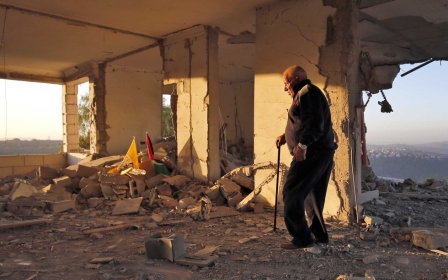Khan al-Ahmar: Israel's top court approves demolition of Palestinian village

Israel's High Court of Justice has rejected petitions filed by residents of the Palestinian Bedouin village of Khan Al-Ahmar, paving the way for the eviction of the community and demolition of the entire village, which can now be carried out any time after 12 September.
Khan Al-Ahmar is located in the occupied West Bank near Route 1, which connects occupied East Jerusalem to the Jordan valley. The village is near the illegal Israeli settlement of Kfar Adumim.
Israeli Defence Minister Avigdor Lieberman welcomed the High Court's ruling, tweeting: "I congratulate the judges of the High Court of Justice for a courageous and obvious decision - in the face of a concerted hypocritical assault by [Palestinian Authority President Mahmoud Abbas] Abu Mazen, the left and European countries. No one is above the law. No one will prevent us from exercising our sovereignty and our responsibility as a state."
Translation: Khan al-Ahmar will be evicted! I congratulate the judges of the High Court of Justice for a courageous and obvious decision - in the face of a concerted hypocritical assault by Abu Mazen, the left and the European countries. No one is above the law. No one will prevent us from exercising our sovereignty and our responsibility as a state.
The petitions rejected by the High Court had objected to the wording of the eviction order issued in May, and claimed that Israel's Civil Administration - the military body administrating in the occupied Palestinian territory - had not examined requests by Khan Al-Ahmar residents to obtain building permits in the area.
Ahmed Tibi, an MK on the Arab Joint List, said in a tweet: "The High Court of Justice, that approved almost all the injustices of the [Israeli] occupation since 1967, has surpassed itself this time and decided to evict Khan Al-Ahmar. A blatantly immoral decision, submissive but definitely in the spirit of the new commander: Ayelet Shaked".
Shaked, Israel's justice minister, has been accused by politicians of "terrorising" the judges of the High Court of Justice to rule in favour of decisions and laws that are proposed by the right-wing government of Prime Minister Benjamin Netanyahu.
The residents of Khan Al-Ahmar are from the Jahalin tribe, a Bedouin family expelled from the Naqab desert - also referred to as the Negev - during the 1948 Arab-Israeli war. The Jahalin then settled on the eastern slopes of Jerusalem.
The Khan al-Ahmar community comprises of some 35 families whose makeshift homes and schools, mostly made of corrugated metal and wood, have been demolished by the Israeli army several times in past years.
Israeli human rights group B'Tselem said in a statement that judges of the High Court "described in their ruling an imaginary world with an egalitarian planning system that takes into account the needs of the Palestinians as if there had never been an occupation".
"The reality is diametrically opposed to this fantasy, the Palestinians cannot build legally and are excluded from the decision-making mechanisms that determine how their lives will look. The planning systems are intended solely for the benefit of the [Israeli] settlers. This ruling shows once again that those under occupation cannot seek justice in the occupier’s courts," B'tselem added.
Israel intends to demolish the village as part of the so-called E1 plan, which involves building hundreds of settlement units to link the settlements of Kfar Adumim and Maale Adumim with East Jerusalem in the Israeli-controlled Area C of the West Bank. If fully implemented, critics say the E1 plan would effectively split the West Bank in half.
Israel said in July it plans to relocate the 180 residents of Khan Al-Ahmar to an area about 12km away, near the Palestinian village of Abu Dis. But the new site is adjacent to a landfill, and rights advocates say that a forcible transfer of the residents would violate international law applying to occupied territories.
Palestinian activists and officials say the scheme to displace Palestinian residents in the area aims to expand illegal settlements, isolate East Jerusalem from Palestinian communities in the West Bank and effectively cut off the southern and northern West Bank, forcing Palestinians to make even lengthier detours to travel from one place to another.
Last July, Israeli soldiers cracked down on activists who had come to support the town's residents, injuring 35, four of whom were hospitalised. Thirteen people were arrested, including a teenage girl, a Palestinian official said then.
Israel regularly demolishes Palestinian homes and schools in the West Bank, arguing that they were built without a permit. But Human Rights Watch notes that "the Israeli military refuses to permit most new Palestinian construction in the 60 percent of the West Bank where it has exclusive control over planning and building, even as the military facilitates settler construction".
In 2016, the UN Security Council passed a resolution that condemned "all measures aimed at altering the demographic composition, character and status of the Palestinian Territory occupied since 1967, including East Jerusalem".
New MEE newsletter: Jerusalem Dispatch
Sign up to get the latest insights and analysis on Israel-Palestine, alongside Turkey Unpacked and other MEE newsletters
Middle East Eye delivers independent and unrivalled coverage and analysis of the Middle East, North Africa and beyond. To learn more about republishing this content and the associated fees, please fill out this form. More about MEE can be found here.





